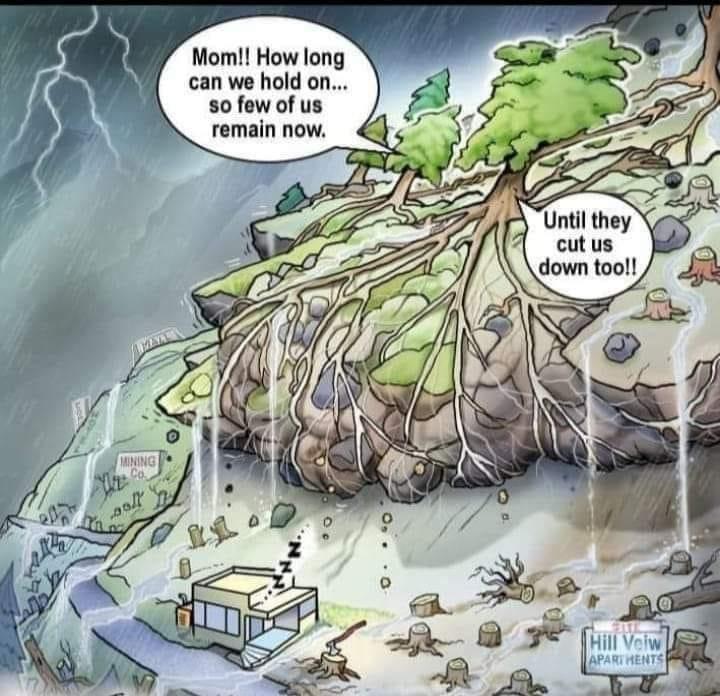The depletion of natural resources is one of the most concerning issues in our society today. The leading causes behind the depletion is the overconsumption of the finitely available natural resources. We tend to consume these resources faster than the earth can replenish them, hence the need for a balance that we need to strike between our consumption of renewable and non renewable resources. According to Global Footprint Network, we used a year’s worth of resources in seven months in 2018.
So what are these Natural Resources?
Natural resources are naturally occurring substances like minerals, forests, water, and fertile soil that enable economic gain. As the human population increases and economies develop, we’re using natural resources at an unsustainable rate.
While the day when the earth is completely dry and desolate is probably still far off, we’re already seeing some of the effects of resource overuse. We need to act now by adopting an eco-friendly lifestyle to protect our planet for ourselves and future generations.The prime reason behind the depletion of our natural resources is irresponsible human behaviour and the mismanagement of our natural resources. The depletion of the natural resources affects the health of our planet and all of its species – including us.
Understanding the causes behind the imbalance in our natural resources
Overconsumption.
Overpopulation is the main cause behind the overconsumption of our natural resources. In the past two centuries, our global human population has increased from 1 billion people to 8 billion. This is a staggering increase, as we have significantly raised our population more in 200 years than we have in our entire existence on our planet. This leads to the unnecessary usage of certain natural resources causing a rapid increase in the depletion of our resources.
Deforestation and the Destruction of Ecosystems leading to loss of biodiversity.
Humans are also cutting down trees to make space for residential complexes and multiplexes. Through deforestation, the planet not only loses trees but also thousands of animals and great plant biodiversity due to the destruction of their natural habitats. Moreover, increased logging activities lead to soil erosion that degrades natural soil minerals.
Mining of Minerals and Oil.
Minerals such as Gasoline, Copper, and Zinc production are estimated to decline in the next 20 years. Oil mining continues to rise due to the upsurge in the number of engines that use petroleum thereby magnifying its depletion. The peak oil theory supports this fact by putting forward that there will come a time when the globe will experience uncertainties on alternative means of fuels owing to the over-harvesting of petroleum.
Technological and Industrial Development.
The present-day world is incessantly becoming industrialised as more and more countries make major technological breakthroughs. But as technological advancements continue, there is considerable growth in industries that release toxins and chemical by-products which are eventually deposited in lakes, soils, and lands. As a result, the by-products and toxic materials alter natural habits such as aquatic systems and wildlife
Pollution and Contamination of resources.
Uncontrolled release of carbon monoxide, nitrous oxide, sulphur oxide, and carbon dioxide, for example, have resulted in the degradation of the ozone layer and global warming – environmental changes with their resultant depletive impacts on different natural habitats. Millions of different animal and plant species have thus lost their natural habitats and are on the verge of extinction.
How can we individually have any impact on such large scale issues?
Mainstream media and environmentalists have indeed drilled the message that we are slowly killing off the earth deep into our heads and all of us are well aware of the consequences that this unsustainable consumption and wastage of our natural resources are quite drastic.
If that is the case then why isn’t every person on the planet taking action towards living a more eco friendly lifestyle? The reason behind this is that with their messaging the media and environmentalists have educated us about the impacts but haven’t conveyed to us how we can individually impact such large scale issues.
10 things that an individual can do to save natural resources.
Waste less water
Taking shorter showers or turning off the faucet while brushing your teeth can reduce water waste in your home. Only use your dishwasher or washing machine when there is a full load, and switch to energy-saving appliances if possible.
Turn off the lights
Turn off any lights or televisions after you leave a room. Unplug appliances like portable air conditioners, toasters, and coffeemakers when not in use, as they can continue to use small amounts of electricity. Additionally, LED light bulbs require far less wattage than standard bulbs, so switching to this alternative lighting method can also help conserve resources.
Use Renewable Energy
Renewable energy replenishes itself, cutting down on our need to harvest new resources. Using solar panels or wind energy can significantly reduce our reliance on natural gas and cut back on resource depletion over time.
Recycle
Making new products requires the use of resources, but recycling helps reuse the materials we already have. Manufacturing fewer new materials reduces waste, which helps decrease groundwater and air pollution. Find a centre that accepts items like plastic bottles, cardboard, or aluminium for recycling.
Compost
Composting is a great way to convert your food scraps into useful materials for your home garden. Composting enriches your soil and reduces the need for watering by improving runoff, which reduces soil erosion. Composting encourages sustainability and can lessen the amount of waste and pollution produced by food waste.
Choose reusable goods
Avoiding single-use plastics is another way to conserve resources. Instead of buying water bottles, plastic cups, or paper plates, opt for ceramic, metal, or glassware. Use your own fabric grocery bags rather than plastic bags. Reusing items is a great way to reduce waste and keep excess trash out of landfills to maintain the eco-friendly habitat.
Manage your Thermostat
Heating and air conditioning make up approximately half of your energy bill, but lowering the heat by just two degrees in the winter can help conserve energy in your home. Raising the thermostat two degrees in the summer will also have energy-saving effects and help reduce your monthly bill and ensure we promote a sustainable habitat.
Thrift Shop
Thrift shopping increases the amount of time between the use and disposal phase of a garment’s lifecycle, giving us more out of our used clothing, which can decrease the need for overproduction and manufacturing
Reduce Food Waste
Approximately a third of the food produced for human consumption every year gets wasted or lost. Because of all the resources required to grow, transport and prepare the food, this is a huge waste. Keeping track of the food you have, planning meals and shopping trips ahead of time and properly storing food can help reduce food waste at home.
Drive Less
Gasoline is a product made from crude oil, a finite natural resource and fossil fuel. Car manufacturing also requires many different kinds of natural resources, including rubber and various metals.You can conserve natural resources by not owning a car, owning a more fuel-efficient car or driving less. Walking, bicycling, taking public transportation and carpooling are all excellent alternatives to driving.
Individual contribution can have a huge impact collectively
Most people think issues such as climate change, global warming and Depletion of natural resources are too big for them to have any impact on and therefore fail to change their daily behaviour which can have a huge compound effect over a long period of time. But the truth is that small changes and improvements can have an immense impact over a period of time; it’s called the principle of ‘aggregate marginal gains‘, and is the idea that if you improve by just 1% consistently, those small gains will add up to remarkable improvement. Therefore it’s time for all of us to have an individual epiphany and start making incremental changes in our lifestyle by adopting the eco-friendly lifestyle slowly and steadily and having a huge impact on the environment.




 Each title in our collection is more than just a book - it’s a ‘green gift’, promoting mindful reading, sustainable values, and a culture of eco-conscious living. By gifting books, you open doors to new ideas, support lifelong learning, and nurture a more informed, compassionate, and environmentally aware individual.
Each title in our collection is more than just a book - it’s a ‘green gift’, promoting mindful reading, sustainable values, and a culture of eco-conscious living. By gifting books, you open doors to new ideas, support lifelong learning, and nurture a more informed, compassionate, and environmentally aware individual.